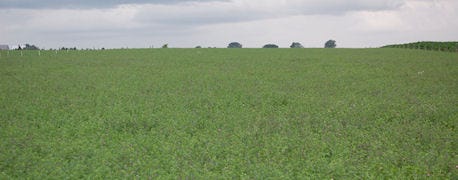August 11, 2014

DuPont Pioneer agronomists recommend late summer as an excellent time to establish alfalfa stands for next spring.
Here are nine tips for getting the most out of late-summer planting.
1. Plant six weeks before first killing frost. Alfalfa needs 45 days' growth from germination to the first killing frost to survive the winter.
2. Eliminate weed competition. Use a burndown herbicide like glyphosate to control perennial weeds and volunteer small grains prior to planting.
3. Lime and fertilize. Before summer planting, have your soil tested, and follow lime and fertilizer recommendations for phosphorus, potassium and sulfur.

Check Out These 9 Tips for Late-Summer Alfalfa Planting
4. Direct seed alfalfa for best success. Companion crops compete for sunlight and moisture. If a companion crop is needed to prevent erosion, control oats by planting at one-half bushel per acre.
5. Plant when soil conditions are right. Avoid planting alfalfa into extremely dry soil with little chance of rain in the near-term forecast.
6. Monitor seeding depth. Ideal planting depth for alfalfa in clay or loam soils is one-quarter to one-half inch. For light or sandy soils, seeds should be placed at one-half to three-quarters inch deep.
7. Plant winter-hardy, disease-resistant varieties. Seedling diseases are not as important in the late summer seeding as in spring seeding, but major diseases and winter-hardiness are still key factors for persistence.
8. Maintain normal seeding rates. Plant alfalfa at 15 to 18 pounds per acre to ensure an adequate stand.
9. Don't reseed into old alfalfa stands. Alfalfa plants produce a toxin that can reduce root development and survival of new seedlings. You can reseed immediately into a failed spring seeding (or one from the previous fall), but if an alfalfa stand is more than a year old, don't attempt to reseed for at least one year.
While late-summer seedings present some risks, they offer many advantages for establishing strong, productive alfalfa stands on your farm.
Source: DuPont Pioneer
You May Also Like




